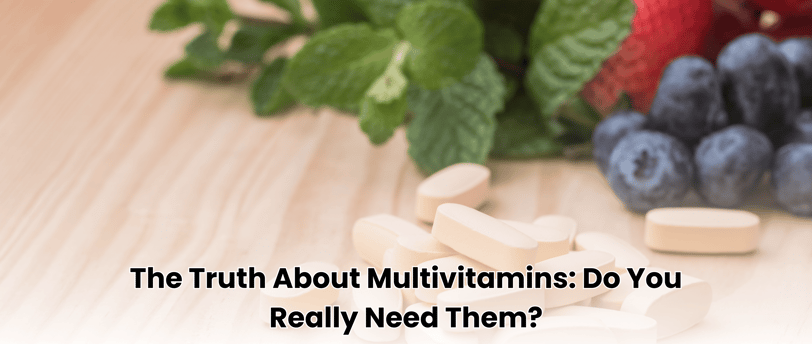The Truth About Multivitamins: Do You Really Need Them?
Multivitamins are among the most commonly used health supplements worldwide. Many people believe that taking a daily multivitamin can improve their health, boost energy levels, and even prevent diseases. But is that really true? Let’s explore the facts and bust some common myths about multivitamins.
2/12/20252 min read


What Are Multivitamins?
Multivitamins are supplements that contain a combination of vitamins, minerals, and sometimes other nutrients like herbs and amino acids. They come in various forms, such as tablets, capsules, powders, and liquids. The goal of multivitamins is to fill any nutritional gaps in your diet.
Myth #1: Everyone Needs a Multivitamin
The Truth: If you eat a balanced diet rich in fruits, vegetables, whole grains, lean proteins, and dairy, you may not need a multivitamin. Most people get sufficient vitamins and minerals from food alone. However, certain groups, such as pregnant women, older adults, and people with specific medical conditions, may benefit from supplementation.
Myth #2: Multivitamins Give You Instant Energy
The Truth: Vitamins and minerals don’t directly provide energy like carbohydrates, fats, and proteins do. However, they help your body convert food into energy. If you have a deficiency, a multivitamin might help improve your overall well-being, but it won’t act as an instant energy booster.
Myth #3: More Vitamins = Better Health
The Truth: Taking excessive amounts of certain vitamins and minerals can be harmful. For example, too much vitamin A can cause liver damage, and excessive iron intake can lead to digestive issues and other health problems. It’s always best to follow the recommended daily intake and consult a doctor before taking high doses of any supplement.
Myth #4: Multivitamins Prevent Chronic Diseases
The Truth: While some studies suggest that vitamins like vitamin D and calcium can support bone health and reduce the risk of osteoporosis, there is no strong evidence that multivitamins alone prevent serious diseases like heart disease or cancer. A healthy lifestyle, including a balanced diet and regular exercise, is far more effective.
Who Might Benefit from Multivitamins?
While most healthy individuals don’t need multivitamins, certain groups may benefit, including:
Pregnant and breastfeeding women – Need extra folic acid, iron, and calcium.
Older adults – May require more vitamin D, B12, and calcium.
People with dietary restrictions – Vegans, vegetarians, and those with food allergies may miss out on essential nutrients.
Individuals with medical conditions – Those with digestive disorders or chronic illnesses may need supplementation.
Should You Take a Multivitamin?
If you suspect you have a deficiency or belong to one of the groups above, it’s best to consult a healthcare professional before starting a multivitamin. They can recommend the right supplement based on your health needs.
Final Verdict
Multivitamins are not magic pills. They can help fill nutritional gaps, but they are not a substitute for a healthy diet. The best way to get essential vitamins and minerals is through natural, whole foods. If you eat a well-balanced diet and lead a healthy lifestyle, you may not need a multivitamin at all!
